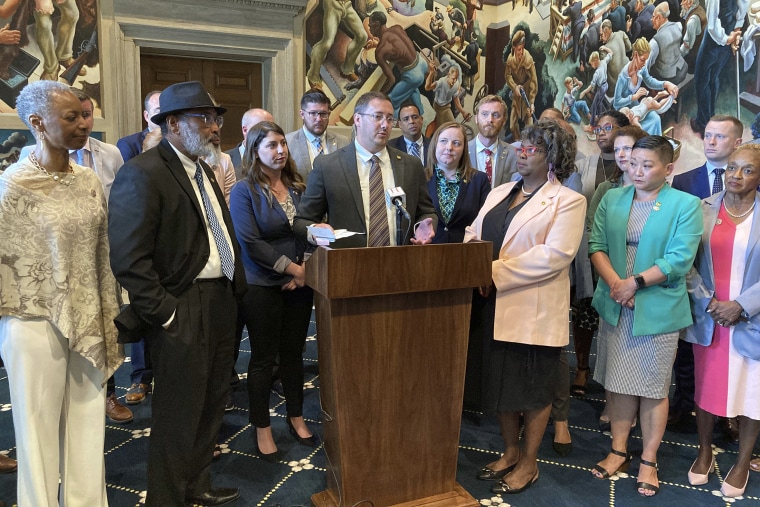More than 30 prominent Republican officials and conservative leaders filed an amicus brief with the U.S. Supreme Court on Tuesday opposing a Tennessee law that bars transition-related care for minors.
“While the government has a role in keeping kids safe, that role is limited, and it does not justify the State second-guessing the judgments of parents acting in good faith who are best positioned to know what their children need,” the signatories wrote. “States have no business overruling the decisions of fit parents who make an informed medical choice for their children that is supported by their doctors, by the medical profession more generally, by the children themselves, and by their conscience.”
The Supreme Court agreed in June to hear the case, L.W. v. Skrmetti, as Republican lawmakers in dozens of states have introduced bills to restrict gender-affirming care — including puberty blockers, hormone therapy and surgeries — for minors and, in some states, adults on Medicaid. So far, 26 states, including Tennessee, have adopted such measures.
Among the signatories of the amicus brief are eight former Republican members of Congress: Reps. Christopher Shays of Connecticut, Ileana Ros-Lehtinen of Florida, Connie Morella of Maryland, Susan Molinari of New York, Deborah Pryce of Ohio, Claudine Schneider of Rhode Island, and Barbara Comstock and Denver Riggleman of Virginia. The list also includes three currently serving Republican state lawmakers — Wyoming state Rep. Dan Zwonitzer and Missouri state Reps. Chris Sander and Chad Ingels — and Brian Jones, communications director for John McCain’s 2008 presidential campaign and a senior adviser to Mitt Romney’s 2012 presidential bid.
“It is imperative that we come together as Republicans, conservatives, parents and advocates to stand in support of individual liberties and non-discrimination protections while preserving limited government and parental rights,” Ros-Lehtinen, who has a transgender son, said in an emailed statement to NBC News.

Ros-Lehtinen is the mother of Rodrigo Heng-Lehtinen, the executive director of Advocates for Trans Equality (formerly the National Center for Transgender Equality), the largest trans rights advocacy group in the country.
“We all can agree that parents know what is best for their children and the government should not stand in the way of parents making well-informed decisions,” Ros-Lehtinen added. “This brief emphasizes that the Court must recognize that blanket bans pose serious risks to members of the LGBT community, limited government and personal freedom.”
In addition to arguing that Tennessee’s law violates parents’ constitutional rights to raise their children, the brief argues that the law violates the equal protection clause by allowing cisgender children, who aren’t trans, to receive puberty blockers, hormone therapy and surgery for other reasons. Cisgender children may be prescribed puberty blockers, for example, if they begin puberty too early.
The brief marks one of the largest groups of current and former Republican officials to take a stance against restrictions on trans health care after only a handful have publicly opposed such legislation.
Sander, one of the Missouri House representatives who signed the amicus brief, opposed state bills to restrict trans health care and trans student athletes’ participation on school sports teams last year on the House floor.

Last May, when the Missouri House voted on the bill to restrict transition-related care for minors, Sander, who is gay, told The Associated Press he was considering leaving his party after his Republican colleagues wouldn’t allow him to speak on the bill even though he had his hand raised throughout the vote.
“It’s not a partisan thing to be gay or trans,” Sander told reporters after the vote, according to the AP. “It has nothing to do with being a Republican or a Democrat. They want to make it about party politics by zipping my lips.”
At least one of the signatories, Wyoming state Rep. Zwonitzer, voted in favor of a state bill to prohibit transition-related care for minors. He said the vote, held this past March, “was rooted in a desire to protect the interests of our state’s youth, ensuring that decisions of such profound consequence are made with caution and care.” Zwonitzer said he supported amendments to the bill, including one that allowed minors to continue receiving psychiatric care to address gender dysphoria, or the distress that results from a misalignment between someone’s assigned sex at birth and gender.
“The legislative process afforded me the opportunity to incorporate amendments to craft a bill that, while far from perfect, was less restrictive in nature,” Zwonitzer said in a statement last week.
“The Supreme Court’s forthcoming decision in Skrmetti is about more than a single state’s ban. It’s also about safeguarding Bostock’s profound and rightly established federal protections against employment discrimination based on sexual orientation and gender identity discrimination,” he added, referencing the court’s 2020 decision in Bostock v. Clayton County.
Some legal experts fear that a Supreme Court decision in favor of Tennessee’s law could be the first step at undermining key arguments used in Bostock, as they both use the equal protection clause to argue against discrimination based on gender identity.
Only two Republican governors — former Arkansas Gov. Asa Hutchinson in 2021 and Ohio Gov. Mike DeWine last year — have vetoed bills that limit transition-related care for minors. Both of those vetoes were overridden by the Republican-led legislatures.
Though the brief argues against Tennessee’s law, it argues in favor of some measures that LGBTQ rights activists are generally supportive of, including those that would prohibit teachers from disclosing a child’s trans identity to their unsupportive parents.
If Tennessee and other states with health care restrictions “can impose their will on parents, then so can states and local governments that think differently — for instance, by allowing (or even requiring) schools to shut parents out of discussions regarding their child’s gender expression,” the brief says. “Beyond the gender identity context, there is no end to the kinds of parental decisions that local, state, or federal officials could hijack whenever they think they know better than parents.”
Also on Tuesday, more than 160 Democratic members of Congress filed a separate amicus brief to the court calling Tennessee’s law “unscientific” and “dangerous.”
For more from NBC Out, sign up for our weekly newsletter.

